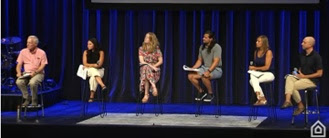A few more things emerging from the August 14 Town Hall meeting by The Meeting House about additional substantiated allegations of sexual abuse by former pastors Bruxy Cavey and Tim Day
People on social media reacted with anger after Bruce Miller, a member of the church’s Board of Overseers, said he had told Cavey “God isn’t finished with you yet” and that maybe Cavey might have a future ministry “speaking to other ministers” about what he did wrong.
Significantly, the other members of the Board were quick to note those were Miller’s personal thoughts and did not represent the church.
Miller himself walked his comments back later, noting he was not “striving to return him [Cavey] to ministry . . . that is up to God.”
He was not advocating Cavey return to The Meeting House, he went on to say.
Miller may have been the one to say that out loud in that way, but others seemed to share his opinion.
During the Q & A period, there was pushback against the Board with some people wondering why they hadn’t had a chance to hear Cavey’s side of the story yet.
That prompted a sharp response from Jennifer Hyrniw, a member of the Board, who said: “Unless someone fully admits and fully repents, we aren’t giving them the opportunity to speak to our community.”
In fact, this meeting featured more questioning about the Board than previous Town Halls. Not everyone was satisfied with the direction or actions the Board had taken.
One person questioned the nature of the sexual abuse, whether it was only inappropriate comments.
The Board quickly responded the abuse was more than that.
Another person accused the Board of not being fully transparent by not disclosing the nature of the abuse or allowing Cavey to speak.
Noting she “spoke for many who feel this way,” she added the Board’s lack of transparency was polarizing and demoralizing the church and contributing to disunity—and to a decline in attendance and giving.
There was light applause after she finished sharing her thoughts.
In response, Hryniw noted the church was trying to respond in a trauma informed way—a way that protected and supported victims. She assured the questioner the Board dealt with the issues in a “robust” way, with the needs of the victims in mind.
If The Meeting House couldn’t handle that kind of response to the abuse—a response that put “the institution at risk”—then “maybe it shouldn’t exist as a church,” she said.
After that exchange, I contacted Melody Bissell, who is serving as an advocate for victims at The Meeting House.
“I think the focus is being shifted to the wrong thing here,” she said of the blame being cast on the Board.
“People want to blame someone,” she said of the criticism of the Board.
But the Board isn’t to blame, she noted; the abusers—Cavey and Day—are responsible for what is happening at the church.
By “pointing fingers at the Board of overseers” members of The Meeting House could lose focus on the victims—the people most in need of support.
Knowing the Board as she does, she wanted to “give credit where credit is due” for the way they have worked through the “painful and excruciating” experiences of the victims, trying to make things right.
She was quick to also credit them for changing the terminology from “sexual harassment,” as described in the first investigator’s report, to “sexual abuse” for the subsequent investigations.
“On behalf of the victims, I am very grateful for that change,” she said.
As for members who are angry with the Board for the way they are responding, “they aren’t looking at the situation through the eyes of the victims,” Bissell said.
More education about a trauma informed approach is needed, she added, noting there was more concern by some about “safeguarding” the church than “caring for the oppressed.”
There’s not point in debating the degree of the abuse, she said. “All abuse is wrong,” she stated.
As for Cavey and his future ministry, “he has lost his right to influence other pastors,” she said, adding his victims “have a lifetime of healing.”
While there is room for “genuine” repentance, Cavey’s actions may “disqualify” him from some roles in the future, she said.
She also praised The Meeting House for being “generous” in financially supporting the victims so they could participate in counselling.

